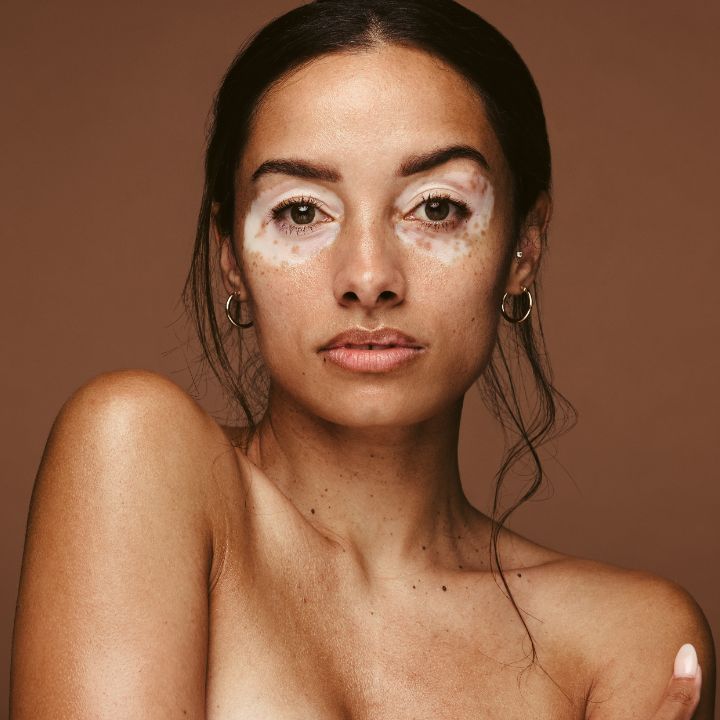
As a skincare consultant, you’ll be faced with a variety of skin conditions. It’s important to be familiar with each condition and know how to best help your clients deal with them. In this article, we’ll discuss 14 common skin conditions you’ll see as a skincare consultant. Plus, we’ll also provide information on what each condition is, and how you can help your clients manage it.
So, let’s get started, shall we?
What Is a Skincare Consultant?
You obviously know the answer to this question if you’re already a working professional. But if you’re considering a career in skincare consulting, you should first understand what the job entails.
A skincare consultant provides advice and guidance to clients on how to best care for their skin. Providing information on ingredients, treatments, and products that may be beneficial for a given skin type or condition are all examples of this.

Skincare Consultant vs. Dermatologist
You must also understand where your job description ends and where a dermatologist‘s begins – because they are very different professions.
A skincare consultant is not a medical professional, whereas a dermatologist is. As a result, there are certain services you won’t be qualified to provide. For instance, you can’t:
- Prescribe drugs, medicated ointments, and medicated creams
- Diagnose skin diseases
- Perform skin biopsies or other medical procedures
Rather, as a skincare consultant, you’ll provide guidance and advice on how to best care for one’s skin. Should you ever come across skin conditions that require medical treatments or prescriptions, advise your client to seek out a dermatologist for further evaluation and treatment.
As a skincare consultant, part of your job description will be knowing when your client’s concern can be handled by you… And when a referral to a dermatologist is in order!
Not yet a certified skincare consultant, but want to be? Become a skincare consultant in 5 easy steps!
What Are Skin Conditions?
Alright, you understand the roles and responsibilities of a skincare consultant. Now let’s talk about skin conditions! Skin conditions are diseases and disorders that affect the appearance or function of one’s skin. They can range from mild to severe in nature, with some being more easily treated than others.
What Can Cause Skin Conditions?
Skin conditions can be caused by a variety of factors, such as:
- Genetics
- Allergies
- Environmental exposure
- Poor skincare habits
Skin conditions can also develop due to underlying issues like hormonal imbalances or autoimmune diseases.
What Are The Most Common Skin Conditions?
There are a multitude of skin conditions out there, and here we’ll discuss 14 of the most common ones you’ll see as a skincare consultant. They include:
- Acne
- Sensitized Skin
- Rosacea
- Eczema
- Psoriasis
- Skin Cancer
- Vitiligo
- Cold Sores
- Hives
- Warts
- Shingles
- Perioral Dermatitis
- Folliculitis
- Keratosis Pilaris
14 Skin Conditions You’ll See as a Skincare Consultant
Let’s take a look at each one individually…
Skin Condition #1: Acne
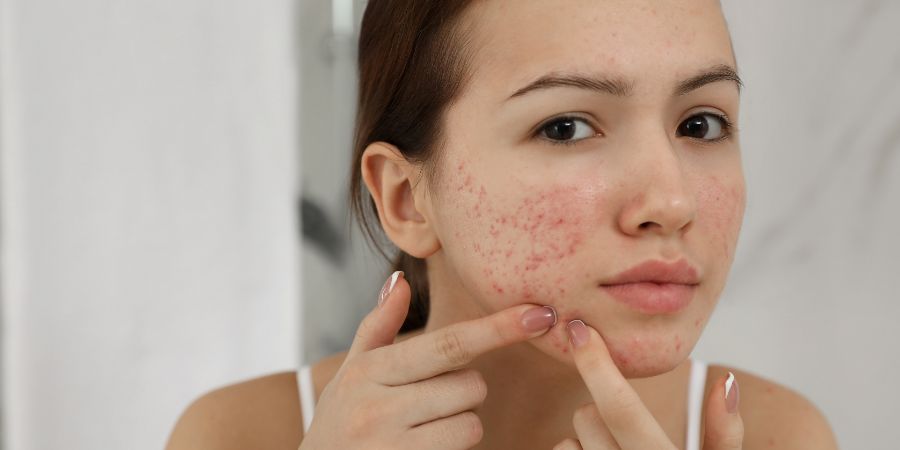
What is Acne?
Acne (a.k.a. acne vulgaris) is a skin condition that is characterized by clogged pores and small, raised bumps on the face, neck, back, chest, and shoulders. It’s most common among adolescents. That said, it can occur in people of all ages, such as babies and the elderly.
What Causes Acne?
Acne can be caused by a variety of factors such as hormonal imbalances, stress, poor diet, genetics, and certain skincare products.
How To Spot Acne as a Skincare Consultant
Luckily, acne is relatively easy to spot as a skincare consultant. Look for small, raised bumps on the face and other areas of the body like the neck, back, chest, or shoulders. However, keep in mind that these may be painful to the touch and can even cause scarring if not treated properly. So, use a gentle (gloved) hand if touching your client’s skin!
How Can You Help Your Clients Manage Acne?
You can help your client manage their acne by first determining the underlying cause. From there, create a treatment plan that targets it. This could include recommending lifestyle changes (i.e. improving diet).
Topical treatments and/or medications may need to be implemented, should the acne be severe enough. Again, though, anything medicated should only be suggested to the client by a dermatologist.
Once you’ve identified the underlying cause, provide your clients with a skin care routine tailored to their needs. This should include using gentle cleansers, non-comedogenic moisturizers (if needed), and products that are specifically formulated for acne management.
Finally, don’t forget to remind your clients of the importance of not picking or popping their zits. This can lead to infection and further inflammation, so it’s best to leave it alone!
Will You Need To Refer Your Client To a Dermatologist?
For mild cases of acne, you should be able to help your client manage the condition with lifestyle changes, topical treatments, and skincare products. However, if the acne is severe or doesn’t seem to be responding to treatment, you may need to refer your client to a dermatologist for further evaluation and treatment.
Skin Condition #2: Sensitized Skin
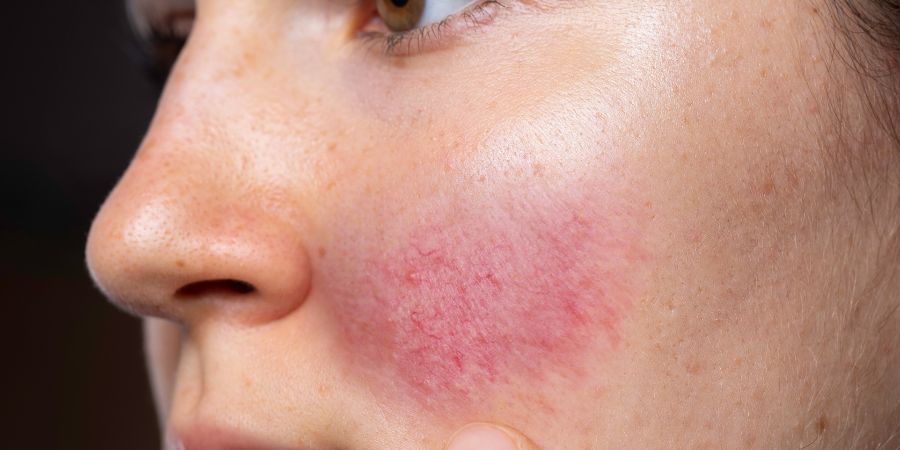
What is Sensitized Skin?
Sensitized skin – also known as irritant contact dermatitis – is a condition in which the skin becomes over-reactive to certain stimuli. In turn, this can lead to redness, inflammation, and discomfort.
What Causes Sensitized Skin?
This skin condition can be caused by a variety of factors such as:
- Environmental stressors (i.e. pollution, wind)
- Skincare products that irritate the skin
- Underlying conditions like eczema or rosacea
How To Spot Sensitized Skin as a Skincare Consultant
Unfortunately, sensitized skin can be quite tricky to spot. Many people may not realize they have it until it’s triggered.
With that in mind, you can look for signs of redness or inflammation on your client’s face. This could indicate sensitized skin. Other symptoms may include stinging, burning, or tightness of the skin, too.
How Can You Help Your Clients Manage Sensitized Skin?
If your client has sensitized skin, then the goal is to identify and avoid the triggers that cause it. For example, you might discover after some investigating that they have an underlying condition, such as eczema or rosacea.
To combat sensitized skin, you might suggest that they avoid certain skincare products. Alternately, maybe you advise that they avoid environmental stressors (like pollution or wind).
When it comes to their skincare routine, your clients should look for gentle cleansers and moisturizers that are free of fragrance and other potential irritants. Also, opting for a more natural-based line of products may help reduce irritation as well!
Will You Need To Refer Your Client To a Dermatologist?
In most cases, you should be able to help your clients manage sensitized skin with lifestyle changes and the right skincare routine. However, you may should refer them to a dermatologist if their symptoms seem severe or don’t respond to treatment. From there, a dermatologist can then assess any underlying conditions that could be causing the sensitization and develop an appropriate treatment plan.
Skin Condition #3: Rosacea
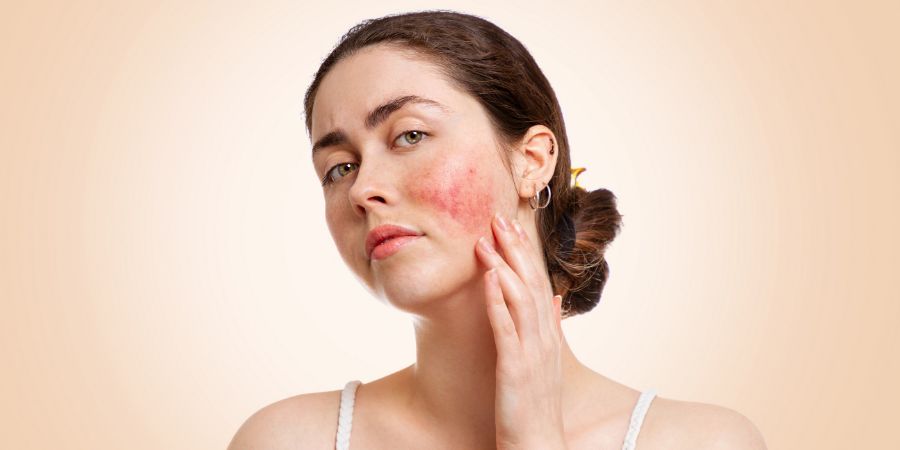
What is Rosacea?
Erythematotelangiectatic rosacea (known simply as rosacea) is a chronic inflammatory skin condition. It’s often characterized by facial redness, bumps, and/or visible blood vessels. Rosacea can range from mild to severe, depending on the individual case.
What Causes Rosacea?
The exact cause of rosacea is unknown. However, it’s believed to be related to a combination of factors such as:
- Genetics
- Environmental triggers (like stress)
- Certain lifestyle choices (like drinking alcohol)
How To Spot Rosacea as a Skincare Consultant
As with any skin condition, proper diagnosis should only come from a dermatologist. However, as a skincare consultant, you may want to look out for signs of persistent facial flushing or redness in your clients. Other signs may include visible blood vessels or bumps on the skin.
How Can You Help Your Clients Manage Rosacea?
When it comes to rosacea, the goal is to identify and avoid potential triggers. Moreover, you want to help your client maintain a gentle skincare routine that won’t aggravate their sensitive skin. As such, avoiding products that are fragranced, alcohol-based, or otherwise irritating is a must!
You should also suggest non-irritating moisturizers and cleansers that are specifically designed for sensitive skin. What’s more, remind your clients of the importance of wearing sunscreen every day. After all, UV exposure can worsen their condition!
PRO TIP: Not sure which ingredients your client’s skincare products NEED to have? Watch this webinar about the 5 best ingredients all skincare products should have!
Will You Need To Refer Your Client To a Dermatologist?
Typically, you can help your clients manage rosacea with lifestyle changes and the right skincare routine. However, you may need to refer them to a dermatologist if their symptoms seem severe or don’t respond to treatment. A dermatologist can then assess any underlying conditions that could be causing the rosacea and develop an appropriate treatment plan.
Skin Condition #4: Eczema
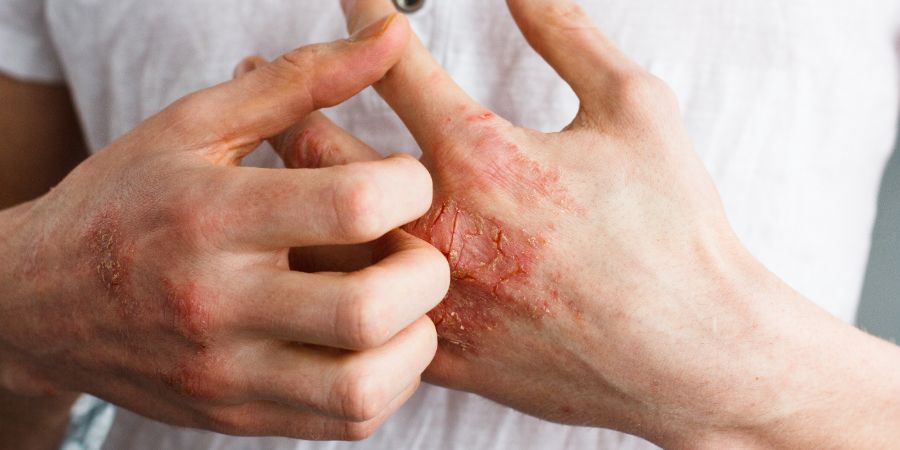
What is Eczema?
Eczema (also known as atopic dermatitis) is a chronic inflammatory skin condition. This skin condition is characterized by itchy and dry patches of skin. It can range from mild to severe. Typically, eczema appears in areas where the body bends such as the elbows, knees, or wrists.
What Causes Eczema?
The exact cause of eczema is unknown. However, it’s believed to be related to:
- Genetics
- Environmental factors (like allergens)
- Certain lifestyle choices (such as wearing tight clothing)
How To Spot Eczema as a Skincare Consultant
If your client suspects they have eczema, look out for signs of dry and itchy patches of skin. The appearance of cracked, scaly, or red skin can also be an indicator of this condition as well.
How Can You Help Your Clients Manage Eczema?
You want to help your client identify and avoid potential triggers, as well as maintain a gentle skincare routine that won’t aggravate their sensitive skin. Thus, you may suggest that they avoid products that are fragranced, alcohol-based, or otherwise irritating.
Furthermore, advise your client to look for non-irritating moisturizers and cleansers that are specifically designed for sensitive skin. They should also focus on calming their inflamed skin using products made with soothing ingredients. Colloidal oatmeal or aloe vera are two awesome examples!
Finally, make sure your client is keeping their skin properly hydrated and wearing sunscreen every day to protect against further irritation.
Will You Need To Refer Your Client To a Dermatologist?
Usually, you should be able to help your clients manage eczema with lifestyle changes and the right skincare routine. But if their symptoms seem severe or don’t respond to treatment, refer them to a dermatologist. They’ll be able to thoroughly assess any underlying conditions that could be causing the eczema and develop an appropriate treatment plan for your client.
Skin Condition #5: Psoriasis
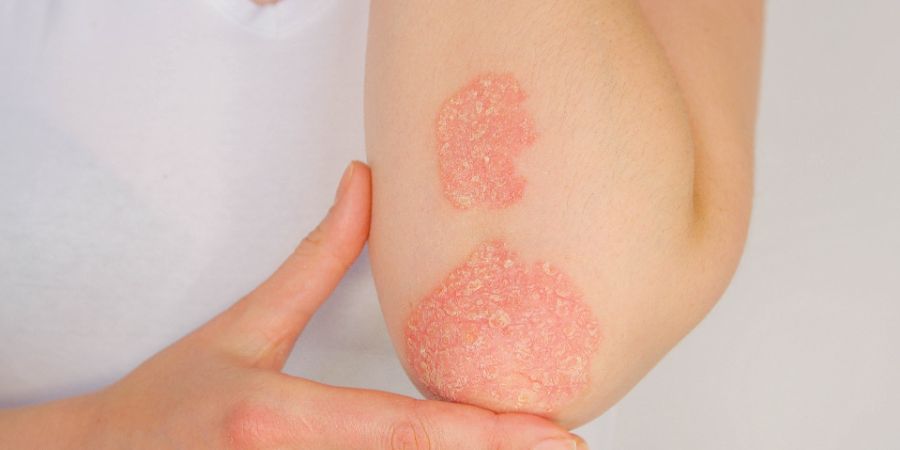
What is Psoriasis?
Psoriasis is a chronic skin condition that also goes by psoriasis vulgaris, chronic stationary psoriasis, and/or plaque-like psoriasis. This condition is characterized by thick, patchy, red or silvery scales on the skin. Typically, psoriasis appears on the elbows, knees, scalp, hands and feet – but it can occur anywhere on the body.
What Causes Psoriasis?
The exact cause of psoriasis is unknown. However, it’s believed to be related to genetics and certain triggers such as stress and injury to the skin (like sunburns).
How To Spot Psoriasis as a Skincare Consultant
You should look for signs of thick patches of inflamed skin that are covered with silvery-white scales. One thing to remember, though, is that psoriasis can be itchy and/or painful. So, if you need to touch your client’s skin for any reason, be sure to do so gently and sanitarily.
How Can You Help Your Clients Manage Psoriasis?
As we’ve mentioned previously, your goal is to identify and avoid potential triggers for your client. You also want to help your client maintain a gentle skincare routine that won’t aggravate their sensitive skin. Furthermore, remind your clients to keep their skin properly hydrated and wear sunscreen every day to protect against further irritation.
Will You Need To Refer Your Client To a Dermatologist?
For the most part, psoriasis can be managed with the right lifestyle changes and skincare routine. Meaning, you should be able to get the job done. Of course, if your client’s symptoms seem severe and/or they don’t respond to treatment, then you may need to refer them to a dermatologist.
Skin Condition #6: Skin Cancer
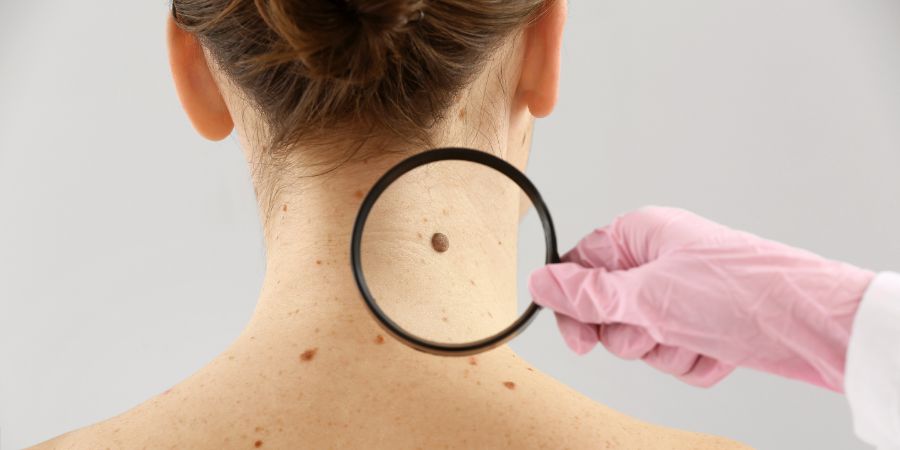
What is Skin Cancer?
Skin cancer is an abnormal growth of skin cells. It can also form on areas of the body that haven’t been exposed to the sun, like the palms and underneath fingernails. Skin cancer can take several forms, including:
What Causes Skin Cancer?
Skin cancer is usually caused by overexposure to ultraviolet (UV) radiation from the sun. That said, it can also be caused by a combination of genetic and environmental factors, such as a family history of skin cancer.
How To Spot Skin Cancer as a Skincare Consultant
Skin cancer can present itself in a variety of ways. So, it’s important to know what you’re looking for when examining your client’s skin.
You’ll notice a bump or patch of abnormal skin (that’s typically discolored) if your client is dealing with basal cell and squamous cell carcinoma. Pay special attention if your client says that these areas are itchy and tender. On the other hand, with melanoma, you should look for a mole that appears asymmetrical. It’ll likely also have irregular borders and changes in color.
Of course, if you’re unsure about anything on your client’s skin, don’t hesitate to refer them to a dermatologist!
How Can You Help Your Clients Manage Skin Cancer?
Most importantly, your client should avoid overexposure to the sun. This includes:
- Avoiding the sun during peak hours (from 10 am – 4 pm)
- Wearing protective clothing
- Using a broad-spectrum sunscreen with an SPF of 30 or higher
You should also advise them to check their skin regularly for any unusual changes, as well as to get regular skin exams from a dermatologist.
Will You Need To Refer Your Client To a Dermatologist?
Yes, your client will need to see a dermatologist right away if they suspect they have any type of skin cancer. In terms of the many skin conditions you’ll see as a skincare consultant, this one is arguably the most serious and dangerous. As such, it will require immediate medical attention.
Skin Problem #7: Vitiligo
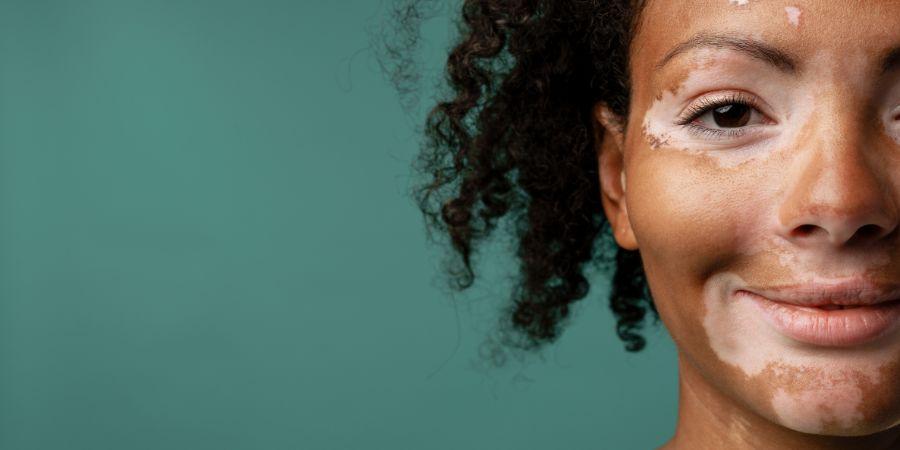
What is Vitiligo?
Vitiligo is a skin disorder that causes depigmentation. This means that affected areas of the skin lose their color. Typically, vitiligo presents itself in patches of pale or white skin on various parts of the body, including the face, hands, arms and legs.
What Causes Vitiligo?
The exact cause of vitiligo is not known for certain. However, it’s thought to be an autoimmune disorder in which the body’s own immune system attacks its melanocytes. These are the cells responsible for producing pigment. Vitiligo can also potentially be caused by genetic factors or environmental triggers (like extreme sun exposure).
How To Spot Vitiligo as a Skincare Consultant
In terms of the different types of skin conditions you’ll see as a skincare consultant, vitiligo is usually quite easy to spot. It typically presents itself as patches of pale or white skin on various parts of the body, such as the face, hands, arms and legs.
How Can You Help Your Clients Manage Vitiligo?
At this time, there is no known cure for vitiligo. That said, there are a few things you can do to help your clients manage their symptoms. This includes helping them adapt their skincare routine with products that contain ingredients like copper peptides, vitamin C and niacinamide. Moreover, they may also benefit from light therapy treatments like laser therapy or phototherapy.
Will You Need To Refer Your Client To a Dermatologist?
Yes, you should refer your client to a dermatologist if they suspect they have vitiligo. This is because the only way to definitively diagnose it is through a physical exam by a medical professional. Furthermore, they may be able to provide additional treatments like steroids or topical immunomodulators that can help manage symptoms.
Skin Problem #8: Cold Sores

What is a Cold Sore?
A cold sore, also known as a fever blister, is a contagious viral infection caused by the herpes simplex virus. Usually, it presents itself as an itchy or painful blister on the lips or around the mouth.
What Causes Cold Sores?
As we just mentioned, cold sores are caused by the herpes simplex virus (HSV). This virus can be spread through direct contact with an affected person, including kissing or sharing utensils and drinking glasses. Stress, hormone changes, and certain medical conditions can also trigger outbreaks of cold sores.
How To Spot Cold Sores as a Skincare Consultant
When examining your client’s skin for any potential skin conditions you’ll see as a skincare consultant, look out for any small fluid-filled blisters on their lips or around the mouth. These usually start as an itchy or painful spot before forming into visible blisters.
How Can You Help Your Clients Manage Cold Sores?
First, advise them to keep their affected area clean and dry. Second, they may benefit from using topical medications like antiviral creams or ointments. If your client experiences frequent outbreaks of cold sores, they may need to take oral antiviral medications prescribed by their doctor.
Will You Need To Refer Your Client To a Dermatologist?
If your client is experiencing significant pain or discomfort from their cold sores or if they suspect they have a serious underlying condition, you should absolutely refer them to a dermatologist for further evaluation and treatment.
Skin Problem #9: Hives
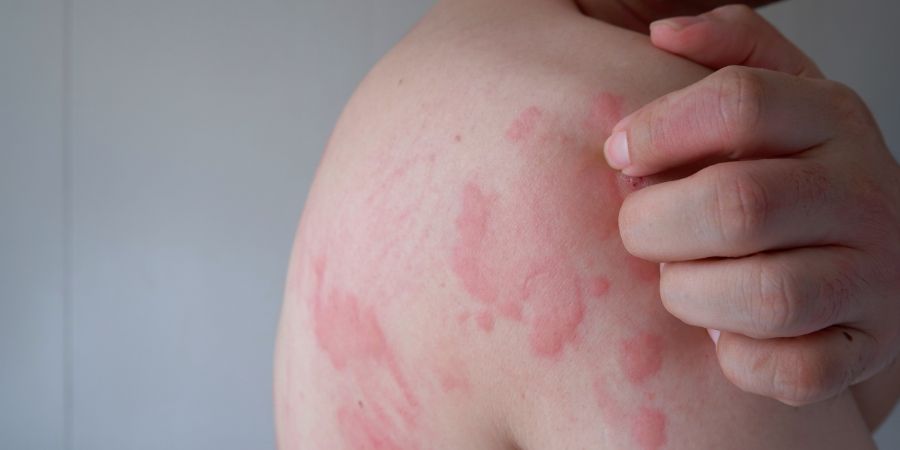
What are Hives?
Hives, also known as urticaria, are itchy and raised welts on the skin that can range in size and shape. They usually appear suddenly and can last for a few minutes up to several weeks.
What Causes Hives?
The exact cause of hives is often unknown, but they’re thought to be triggered by an allergic reaction or irritation from certain substances like pollen or food. Also, physical factors like extreme temperatures or stress can sometimes cause hives to flare up.
How To Spot Hives as a Skincare Consultant
When examining your client’s skin for any potential skin conditions you’ll see as a skincare consultant, look out for red, raised welts on the skin that are itchy or painful. These may range in size, shape and duration.
How Can You Help Your Clients Manage Hives?
You should first recommend that they use topical medications (like hydrocortisone cream) to reduce itching and swelling. Furthermore, your client should avoid any potential triggers, such as certain foods or extreme temperatures, if possible.
Will You Need To Refer Your Client To a Dermatologist?
Yes, if your client’s hives are severe and do not respond to over-the-counter treatments, you should refer them to a dermatologist for further evaluation and treatment. The doctor may prescribe stronger medications to help control their symptoms.
PRO TIP: Become a globally-certified International Skincare Consulting (ISCP) in as little as 2 short months with QC Makeup Academy’s self-paced, online Skincare Course!
Skin Problem #10: Warts
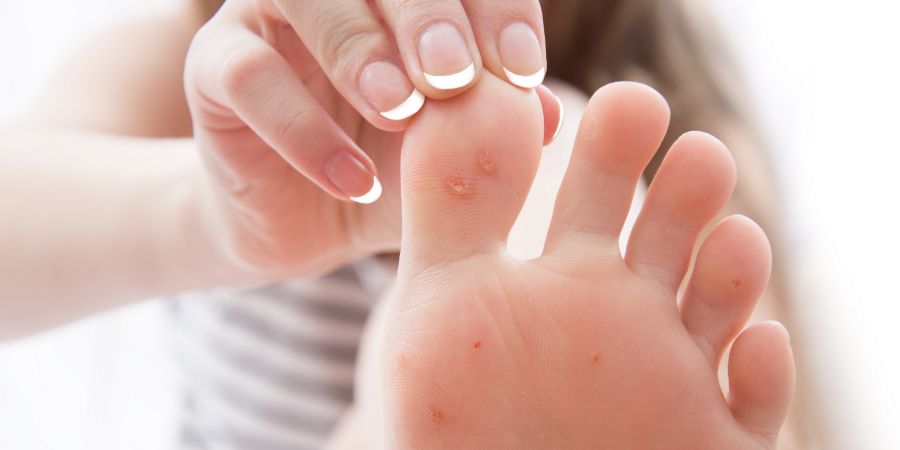
What are Warts?
Warts are non-cancerous skin growths caused by the human papillomavirus (HPV). Common types of warts include:
- Flat warts
- Plantar warts
- Genital warts
They can appear anywhere on the body, but they’re most common on the hands, feet and face.
What Causes Warts?
As previously mentioned, warts are caused by the HPV virus. The HPV virus can be caught in a number of ways, such as (but not limited to):
- Direct contact with an affected person
- Sharing items like towels, clothing, or razors
- Coming into contact with surfaces that have been touched by an affected person
When it comes to skin conditions you’ll see as a skincare consultant, you should approach this particular condition with caution. The reason being, this virus is highly contagious and can spread through direct contact with an infected person or from contaminated surfaces.
How To Spot Warts as a Skincare Consultant
When examining your client’s skin, keep an eye out for small bumps that may have a rough texture and slightly raised surface. These usually develop on the fingers, toes, face, neck and hands.
How Can You Help Your Clients Manage Warts?
To help your clients manage their warts, you should advise them to keep the affected area clean and dry. They may benefit from topical medications like salicylic acid or cryotherapy. You should also let them know that they should avoid touching the wart, as this can spread it to other parts of their body or to other people.
Will You Need To Refer Your Client To a Dermatologist?
Yes, if your client’s warts do not respond to self-care measures or over-the-counter treatments, you should refer them to a dermatologist for further evaluation and treatment. The doctor may prescribe stronger medications to help control their symptoms.
Skin Problem #11: Shingles
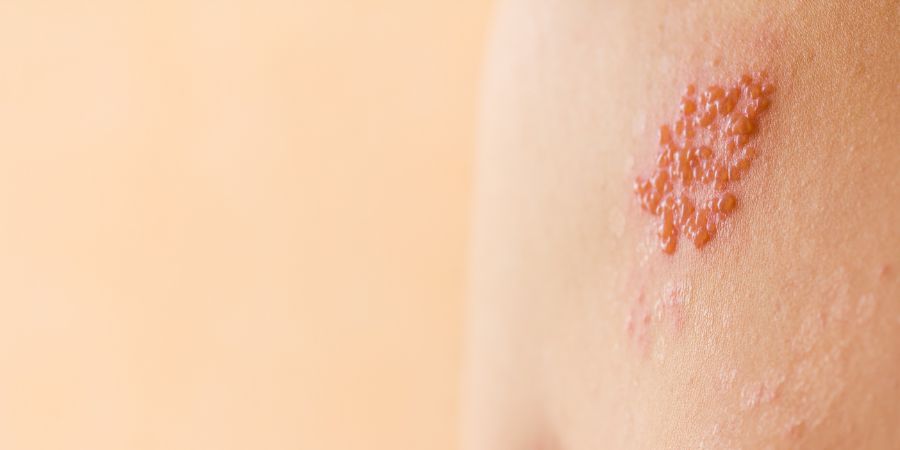
What are Shingles?
Shingles, also known as herpes zoster, is an infection caused by the same virus that causes chickenpox. It can cause a painful rash on one side of the body, which typically appears in a band-like or belt-shaped pattern.
What Causes Shingles?
The exact cause of shingles is unknown, but it’s thought to be triggered by a weakened immune system or stress. It’s also worth noting that anyone who has had chickenpox in their lifetime may experience shingles, since the virus remains dormant in their body after they have recovered from chickenpox.
How To Spot Shingles as a Skincare Consultant
When examining your client’s skin for any skin conditions you’ll see as a skincare consultant, look out for a red rash or blisters on one side of the body. It may be accompanied by itching, tingling or burning pain before the rash appears.
How Can You Help Your Clients Manage Shingles?
To help your clients manage their shingles, you should advise them to keep the affected area clean and dry and use over-the-counter topical medications like calamine lotion to reduce itching. On top of this, they should get plenty of rest and eat nutrient-rich foods to help boost their immune system.
Will You Need To Refer Your Client To a Dermatologist?
Yes, if your client’s shingles do not respond to self-care measures or over-the-counter treatments, you should refer them to a dermatologist for further evaluation and treatment. The doctor may prescribe antiviral medications to help control their symptoms.
Skin Problem #12: Perioral Dermatitis
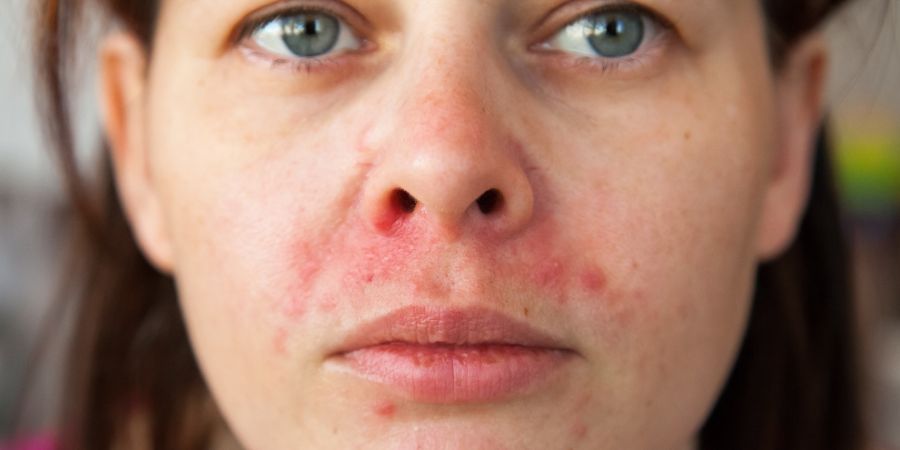
What is Perioral Dermatitis?
Perioral dermatitis is a skin condition that causes red, scaly patches to appear around the mouth. It’s usually seen in women and can be triggered by using topical corticosteroids or other cosmetic products.
What Causes Perioral Dermatitis?
The exact cause of perioral dermatitis is unknown, but it’s thought to be caused by an imbalance of bacteria on the skin. Additionally, certain triggers like harsh skincare products or topical medications, may cause it as well.
How To Spot Perioral Dermatitis as a Skincare Consultant
When examining your client’s skin, look out for red patches or bumps around their mouth that may be accompanied by itching or burning sensation. It’s usually seen in combination with whiteheads and blackheads.
How Can You Help Your Clients Manage Perioral Dermatitis?
To help your clients manage their perioral dermatitis, you should advise them to avoid using harsh skincare products and topical medications. They can also benefit from switching to a milder cleanser and fragrance-free moisturizer. In addition, they should make sure they keep their skin hydrated by drinking plenty of water.
Will You Need To Refer Your Client To a Dermatologist?
Yes, if your client’s perioral dermatitis does not respond to self-care measures or over-the-counter treatments, you should refer them to a dermatologist for further evaluation and treatment. The doctor may prescribe topical antibiotics or steroid creams to help control their symptoms.
Skin Problem #13: Folliculitis
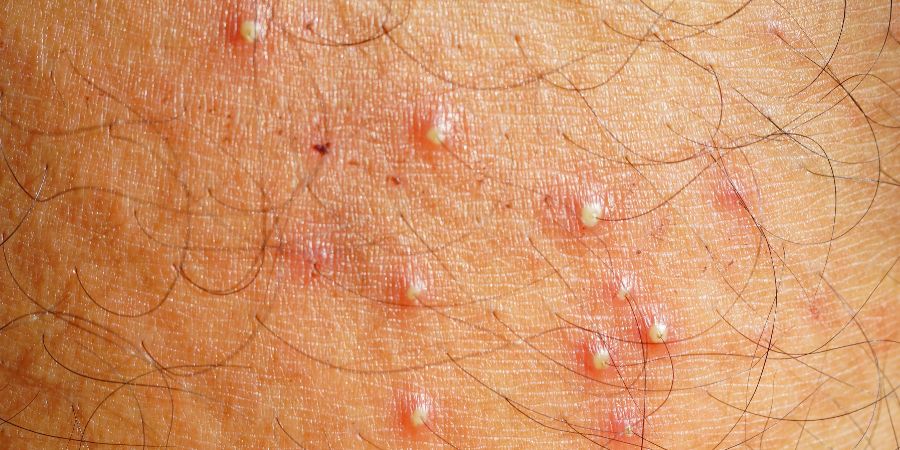
What is Folliculitis?
Folliculitis is an infection of the hair follicles that can present as red bumps and pus-filled blisters. It’s typically seen on the face, scalp, chest and back.
What Causes Folliculitis?
While the exact cause of folliculitis is unknown, it’s believed to be caused by a bacterial or fungal infection. It can also be triggered by tight clothing that rubs against your skin or shaving with a blunt razor.
How To Spot Folliculitis as a Skincare Consultant
When examining your client’s skin for any skin conditions you’ll see as a skincare consultant, look out for clusters of red bumps or blisters that may be accompanied by itching, burning sensation or pus.
How Can You Help Your Clients Manage Folliculitis?
To help your clients manage their folliculitis, you should advise them to keep the affected area clean and dry and avoid hot showers or baths. They can also benefit from applying an over-the-counter cortisone cream to reduce inflammation. You should also advise them to try wearing loose fitting clothing, as well as opting for electric shavers when shaving.
Will You Need To Refer Your Client To a Dermatologist?
If your client’s folliculitis does not respond to self-care measures or over-the-counter treatments, then yes, you should refer them to a dermatologist for further evaluation and treatment. The doctor may prescribe topical or oral antibiotics or antifungal medications to help control their symptoms.
PRO TIP: Be your own boss and do what you love for a living by starting your very own skincare consulting business!
Skin Problem #14: Keratosis Pilaris
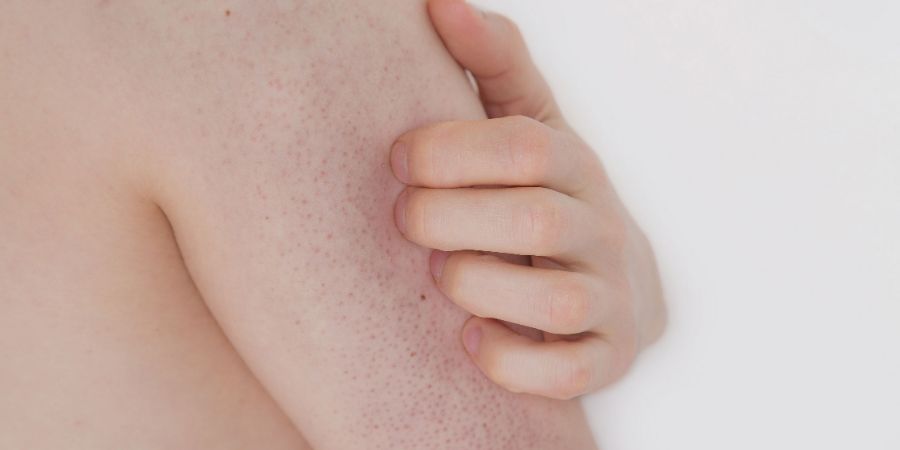
What is Keratosis Pilaris?
Keratosis pilaris (sometimes called “chicken skin”) is a common skin condition that causes rough, bumpy patches on the upper arms, thighs and cheeks. The bumps are caused by excess build-up of keratin, which is a protein found in the skin.
What Causes Keratosis Pilaris?
The exact cause of keratosis pilaris is unknown, but it’s thought to be hereditary or due to a deficiency in certain vitamins or minerals. It can also be triggered by dry skin or excessive exposure to the sun.
How To Spot Keratosis Pilaris as a Skincare Consultant
When examining your client’s skin for any skin conditions you’ll see as a skincare consultant, look out for small, rough bumps on the upper arms, thighs and cheeks. They may be accompanied by itching or dryness.
How Can You Help Your Clients Manage Keratosis Pilaris?
To help your clients manage their keratosis pilaris, you should advise them to keep the affected areas moisturized with thick emollient creams. In addition, they should use gentle cleansers and avoid scrubbing or exfoliating the area too aggressively. Finally, they can benefit from taking daily supplements of vitamins A and C to boost skin health from within.
Will You Need To Refer Your Client To a Dermatologist?
If your client’s keratosis pilaris does not respond to self-care measures or over-the-counter treatments, then yes, you should refer them to a dermatologist for further evaluation and treatment. The doctor may prescribe topical retinoids or moisturizers to help control their symptoms.
Conclusion
Well, there you have it – 14 skin conditions you’ll see as a skincare consultant and how to handle each one. It’s important to be able to accurately identify and advise your clients on how best to manage their particular condition. If the case is more severe, then don’t hesitate to refer them to a dermatologist for further evaluation and treatment.
Got any questions or comments for us? We’re all ears, so leave them for us down below!
Thanks for reading!